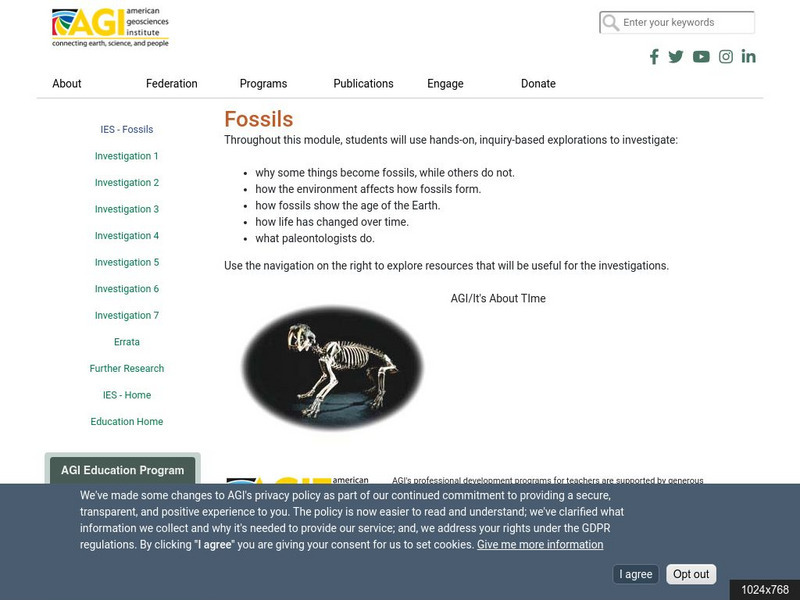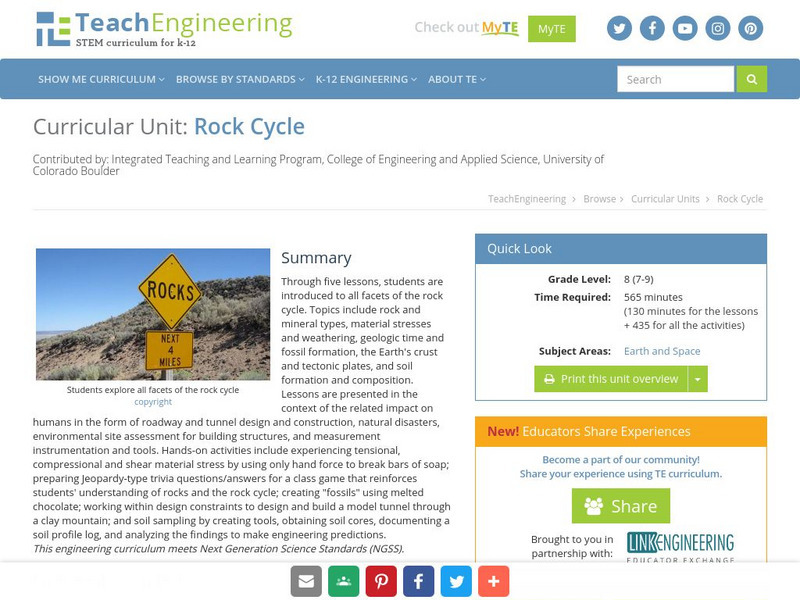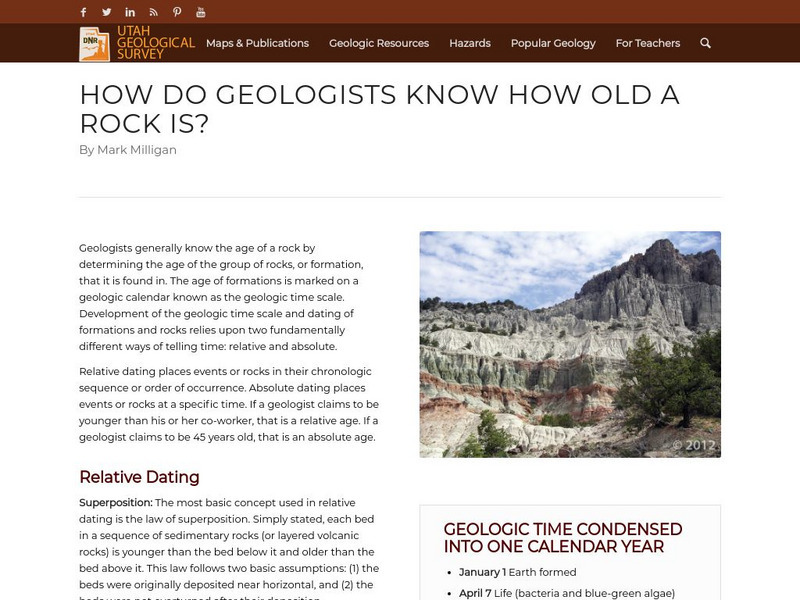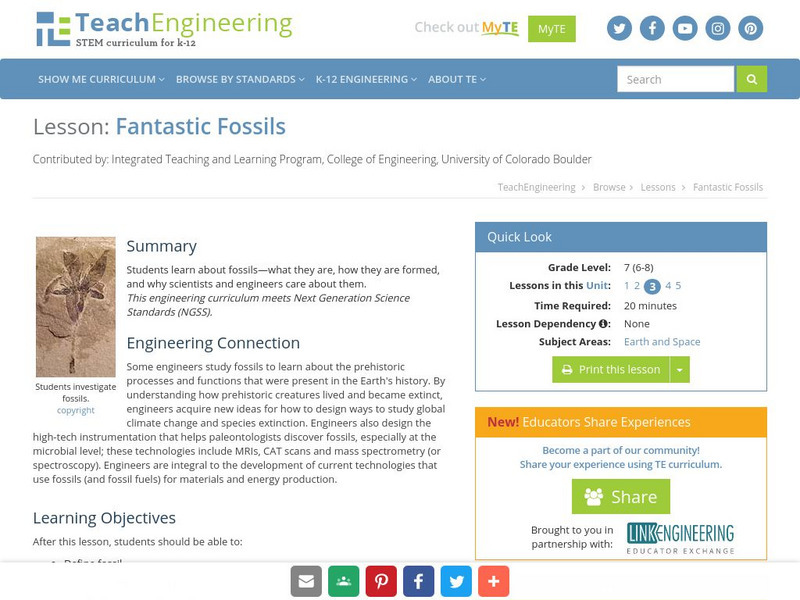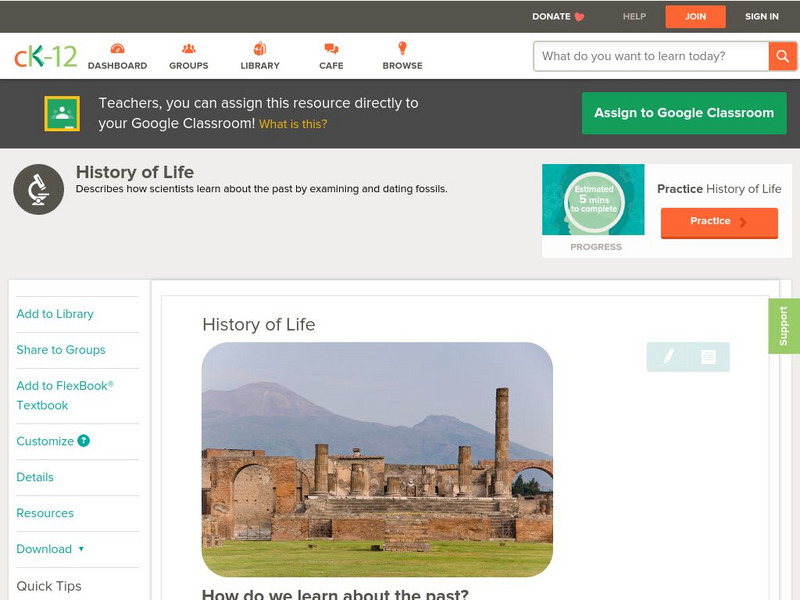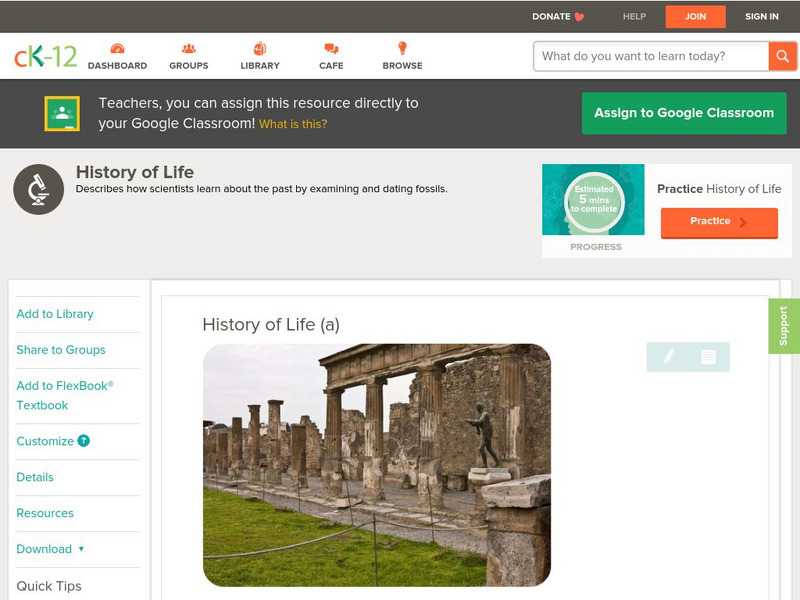Hi, what do you want to do?
American Geosciences Institute
American Geosciences Institute: Fossils
Seven hands-on lessons module where students learn about fossils. These inquiry-based investigations explore how fossils form, properties of fossils, comparing fossils, how they show the age of the Earth, and what paleontologists do.
Science Education Resource Center at Carleton College
Serc: Layer Cake Geology
Using a cake analogy, this activity teaches concepts such as: geologic time, rock layers, fossils, Law of Superposition, and relative dating. Activity can be modified to grade level and appropriate content for students,
Other
Black Hills Institute of Geological Research: All About Fossils
The Black Hills Institute of Geological Research is a world-renowned center for paleontology. Here they describe in clear language how fossils are formed and preserved, and what information they give us about the past, particularly in...
Curated OER
National Park Service: Fossils in Time Unit
In this lesson, students learn about the earth's past by studying clues that have been left behind, such as fossils and rocks. Students will find the answers to many questions: What is paleontology?, What is geological time?, What can we...
American Geosciences Institute
American Geological Institute: Evolution and the Fossil Record
The American Geological Institute has done an excellent job of defining and explaining evolution in this online booklet. Darwin, fossils, natural selection, and change over time are some of the concepts that are covered. Make sure to see...
TeachEngineering
Teach Engineering: Rock Cycle
Through five lessons, students are introduced to all facets of the rock cycle. Topics include rock and mineral types, material stresses and weathering, geologic time and fossil formation, the Earth's crust and tectonic plates, and soil...
Estrella Mountain Community College
Online Biology Book: Paleobiology: Fossils and Time
Find out how fossil evidence has been the major link to learning about Earth's geologic history. See several illustrated interpretations of a geologic time scale in this online biology textbook.
ClassFlow
Class Flow: Life & Geologic Time
[Free Registration/Login Required] This Flipchart accompanies chapter 14 in the Glencoe Earth Science text. The flipchart contains pictures that help students learn about Geologic time: Paleozoic, Mesozoic, Cenozoic and explains...
American Geosciences Institute
American Geosciences Institute: How Do Species Change Over Geologic Time?
Find out about the ways that species change and evolve over time and generations.
Other
Fossil Museum: Geologic Time
Pictures of fossils are arranged in chronological sequence and by geologic period. Pictures include scientific names and location where the fossils were found.
Science Education Resource Center at Carleton College
Serc: American Field Guide: Relative Dating Telling Time Using Fossils
This website integrates video footage and information with lesson plans and activities to teach young scholars about the concept of relative dating. Students will graph a range chart for ammonites, determine the geologic age for several...
Other
Utah Geological Survey: How Do Geologists Know How Old a Rock Is?
Geologists generally know the age of a rock by determining the age of the group of rocks, or formation, that it is found in. The age of formations is marked on a geologic calendar known as the geologic time scale. Development of the...
University of California
Ucmp: A Relative Dating Activity
An learning activity to help young scholars grasp the concept of relative dating and geologic time.
University of California
Ucmp: Online Exhibits
Visit the virtual exhibits at this site to learn more about paleontology, the history of the earth, and life on earth. Use the information on this site to understand geology, geologic time, evolution, and phylogeny.
US Geological Survey
Usgs: Fossils and Rocks
Part of an online publication offered by the U.S. Geological Survey, this articles sheds light on how studying fossils became an important part of understanding geologic time.
Open Curriculum
Open Curriculum: Studying the History of Life
This in-depth article illustrates the concept of geologic time, and helps the learner understand why fossils are rare.
US Geological Survey
Relative Time Scale
This is a good resource for anyone who wants to understand the historical development that led to our understanding of relative dating. This site also has links to index fossils and a table of geologic time.
Science Education Resource Center at Carleton College
Serc: Geo Logic: Lagerstatten and Unique Fossils
With GEOLogic questions, young scholars are asked to match several unique fossils with the sites and locations where they were found, as well as their geologic age.
TeachEngineering
Teach Engineering: Fantastic Fossils
Students learn about fossils - what they are, how they are formed, and why scientists and engineers care about them.
US Geological Survey
The Numeric Time Scale
This is a good source for getting an in-depth description of using radioactive decay to measure the ages of rocks. In addition to describing the process of radiometric dating, this resource also includes a geologic time scale and four...
Other
American Coal Foundation: Lesson Plan: How Was Coal Formed?
Two-part lesson in which middle schoolers learn about when and how coal was formed. They will do research on geologic time frames and order them by eon, era, period, or epoch.
CK-12 Foundation
Ck 12: Fourth Grade Science: Earth Science: Relative Ages of Rocks
[Free Registration/Login may be required to access all resource tools.] Looks at how stratigraphy can be used to determine the relative ages of rocks, how unconformities occur, ways to match rock layers in different areas, and how...
CK-12 Foundation
Ck 12: Biology: History of Life
[Free Registration/Login may be required to access all resource tools.] This comprehensive lesson by CK-12 explains how scientists learn about the past by examining and dating fossils.
CK-12 Foundation
Ck 12: Biology: History of Life
[Free Registration/Login may be required to access all resource tools.] Describes how scientists learn about the past by examining and dating fossils.





